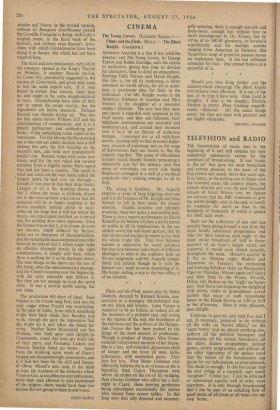OPERA
NEVER quite certain, rightly or wrongly, of its box office, Edinburgh has this year not risked the British, let alone the world, premiere that its establishment as one of the two or three greatest European festivals surely now begins to allow, and its prestige to demand. Glyndebourne again provides the three operatic productions. Two are well-tried—Cost fan tune and Strauss's Ariadne aid Naxos, in the revised version, without Le Bourgeois Gentilhomme (which the Comedic Francais° is doing, with Lully's original music, in the third week of the estival), and without even Busoni's Arlec- chino, with which Glyndebourne have been doing it in Sussex, but which has not been required here.
The third and new production, with which the company opened at the King's Theatre on Monday, is another Rossini revival,
Le Comte Ory, presumably suggested by the success of Cenerentola, and given with more or less the same superb cast. If it was hoped to imitate that success, there may be, and ought to be, some disappointment in store. Glyndebourne have done all they can to repeat the recipe exactly, but the ingredients are below standard. Perhaps Rossini was already drying up. This was his last opera before Williant Tell and his abandonment of composition; and it is a patent, perfunctory and unblushing pot- boiler—if the unblushing is not unjust to his conscience. For the libretto Scribe stretched out a thin one-act comic incident into a still thinner two acts, the first treading on the second's toes, and both very transparently padded out. Rossini wrote only some new music, and for the rest raked out various• numbers from'a slightly earlier Paris opera• that had not been a success. The result is what one critic on the way home called the longest opera he had ever sat through— though it was over in less than three hours. Longest of all is the drinking chorus in Act 2, where the music is pitilessly drawn out in the unscrupulous expectation that the audience will be so happy laughing at the dozen cavaliers larking about in nuns' robes on the stage that it will not notice the music—an expectation justified, as it turned out, for nothing drew more applause. Even the famous trio in Act 2, A la fizveur de cette null obscure, much admired by Berlioz, lacks wit or sharpness of characterisation, and the remarkable unaccompanied ensemble towards the end of Act 1, which might make an effective dramatic stroke in the right circumstances, is simply odd here, where there is nothing for it to be dramatic about. The best things in the opera are the rest of this finale, after the unaccompanied passage, and the Count's cavatina near the beginning, with the witty ensemble that follows it. But they are not enough to keep the opera alive. It was a revival worth seeing, but not twice.
The production fell short of ideal. Juan Oncina as the Count sang best, and was the only singer whose French was convincing. In the part of Adele, from which something might have been made, Sari Barabas was wcak, though she gave the impression that she might do it well when she found her voice. Neither Sesto Bruscantini nor Ian Wallace, who both gave such delight in Cenerentola, could this time get much out of their parts, and Fernanda Cadoni and Monica Sinclair fared no better. Apart from the drinking scene much of Ebert's staging was disappointingly uninventive, and if it had not been for the skill and fantasy of Oliver Messel's sets—and, in the stalls at !cast, the loudness of the orchestra which Vittorio Gui, in his affection and enthusiasm, more than once allowed to take precedence of the singers—there would have been few reasons for not going to sleep in ono's scat.
COLIN MASON



































 Previous page
Previous page